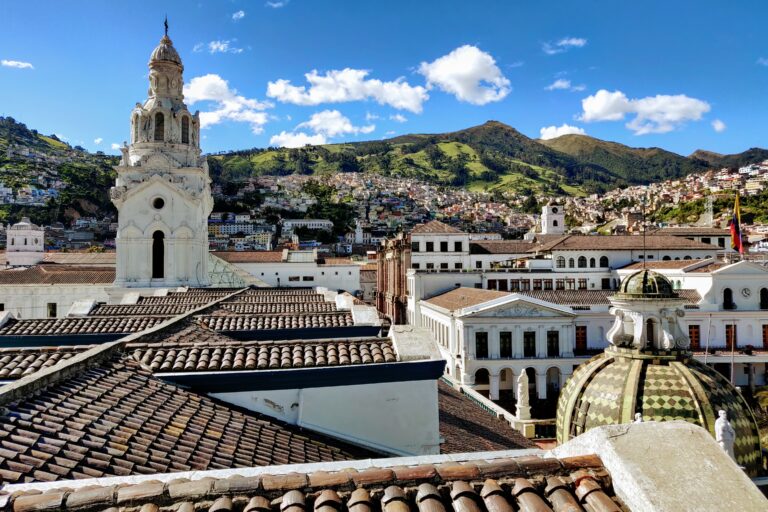Whether you’re seeking a vacation home in the Andes, retiring to a beachside paradise, or investing in a property abroad, buying real estate in Ecuador has become increasingly popular. With its diverse landscapes, affordable housing, and welcoming culture, Ecuador is capturing the interest of international buyers. This guide will walk you through everything you need to know about purchasing property in Ecuador with confidence.
Why Consider Buying Property in Ecuador?
Ecuador’s appeal lies in its affordability and unparalleled landscapes. Here are some reasons why people choose Ecuador:
- Affordable Property Prices: Compared to North America and Europe, housing in Ecuador is significantly cheaper. A modern beachside condo or a cozy Andean home can cost a fraction of what it might elsewhere.
- Quality of Life: Ecuador is celebrated for its welcoming communities, year-round temperate climate, and vibrant traditions.
- Stable Investment Opportunity: With growing interest from expats and travelers, the Ecuadorian real estate market offers opportunities for appreciation in property value.
- Retirement Accessibility: Ecuador consistently ranks as a top retirement destination, thanks to its retiree-friendly visa policies and low-cost housing.
But buying property in Ecuador is about more than affordability. The process requires an understanding of location, laws, and local practices to ensure a streamlined purchase.
Steps to Buying Property in Ecuador
To successfully purchase real estate in Ecuador, follow these essential steps:
1. Understand Local Property Laws
Foreigners can legally own property in Ecuador without restrictions. However, you’ll need to understand the following local practices:
- Properties are generally listed and quoted in U.S. dollars, the country’s official currency.
- Ensure the title deed (or escritura pública) is clean and free from liens or disputes.
Ecuador’s legal framework protects foreign investors, but hiring a local attorney is essential for verifying ownership and handling legalities seamlessly.
2. Choose the Ideal Location
Ecuador is diverse, and choosing the perfect spot will depend on your preferences:
- The Coastline: Known for its tranquil beaches, bustling port towns like Manta and Salinas are ideal for retirees or marine enthusiasts.
- The Andes: Cities like Cuenca and Quito offer rich cultural experiences, colonial architecture, and a mild spring-like climate.
- The Amazon Basin: For nature enthusiasts, the Amazon Basin offers an off-the-grid lifestyle surrounded by unparalleled biodiversity.
- The Galápagos Islands: If you dream of a secluded paradise, investing in the Galápagos comes with unique considerations and additional tourist-specific laws.
Each region has its advantages, so take the time to visit before settling on an area.
3. Work with Trusted Real Estate Agents
Local real estate agents offer valuable insights and help identify options that fit your needs. A reliable agent will:
- Translate and explain property contracts.
- Negotiate on your behalf.
- Navigate the unwritten rules of Ecuador’s property market.
Ensure the agent is registered with a reputable agency or recommended by trusted local contacts to avoid scams.
4. Verify Ownership & Financial Considerations
Before committing to a property, request the following documentation from the seller:
- Title Deed (escritura pública): Verifies ownership.
- Property Tax Certificate (certificado de no adeudar): Confirms all taxes are paid.
- Municipal Records (registro municipal): Ensures there are no encumbrances or issues with the property.
Additionally, most transactions are done in cash. Secure an Ecuadorian bank account for smooth transactions and currency exchange.
Key Benefits of Living in Ecuador
Investing in property in this South American destination isn’t just about real estate. It’s about unlocking a lifestyle that combines affordability with adventure.
- Cost-Effective Living: Retirees and expats often find that a modest income stretches far due to Ecuador’s low cost of living.
- Cultural Richness: Explore vibrant festivals, local markets, and Latin American cuisine.
- Natural Wonders: Whether hiking the Andes or exploring the Amazon rainforest, Ecuador offers something for every adventurer.
FAQs About Buying a Property in Ecuador
Do I need a visa to buy property in Ecuador?
No. Foreigners can own property without residency. However, owning property may help your application for a long-term visa, such as the Investment Visa.
Can I finance a property purchase in Ecuador?
Most property purchases are made in cash, as local financing can be difficult to obtain for foreigners. It’s recommended to secure funds in advance.
What additional costs should I expect?
Beyond the purchase price, anticipate legal fees (approx. 1-2% of the property price), notary fees, and a transfer tax (1% of the property value). These fees are generally split between buyer and seller.
Is Ecuador a safe investment?
Yes! Ecuador’s real estate market, though smaller, is stable. However, thoroughly vet a property’s title and ensure compliance with local regulations.
How can I send money safely for my property purchase?
You can rely on trusted international money transfer services to handle large payments securely. Services like Remitly enable affordable, fast currency transfers, ensuring peace of mind. Learn more about how to send money safely to Ecuador.

